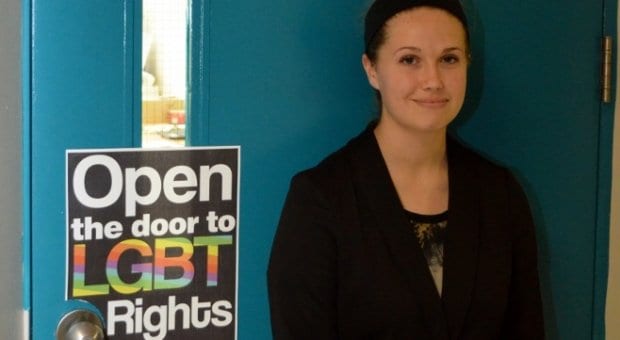From banning Russian-made vodka to petitions urging the International Olympic Committee (IOC) to move the upcoming Sochi Olympics to Vancouver, Canadians are objecting to Russia’s anti-gay propaganda laws. Now Ottawa youth diversity initiative Jer’s Vision has put together a unified campaign with seven steps to help gay Russians fight back against the persecution.
“It’s not our campaign,” says Jer’s Vision founder Jeremy Dias. “Jer’s Vision had no part in coming up with these ideas. These are all coming from Russian people who said, ‘this is what we want.’”
Dias says Jer’s Vision’s main contact has been Nikolai Alekseyev, a former InterPride regional director and current Moscow Pride organizer.
Of the seven steps proposed by the Open the Door to LGBT Rights in Russia campaign, donating money to benefit Gay Russia and Moscow Pride’s anticipated attempt to stage Winter Pride during Sochi 2014 is paramount, says Elizabeth Nichols, who designed the campaign kit’s materials. The goal of the campaign is to raise $50,000 through Canada Action Now.
“They raised four times that to find the Rob Ford crack video,” Dias points out. “When it comes to social justice, these are not easy things to do.”
Additional steps of the campaign include writing letters to Russian president Vladimir Putin and letting Sochi 2014 sponsors know if you are against the anti-gay laws.
Supporters can order campaign kits including buttons and posters outlining each step on Jer’s Vision’s myshopify website.
The kits are currently available in English, French and Spanish with more translations coming in the near future.
Jer’s Vision’s coordinator of research programming, Hannah Collins, is organizing a protest to highlight the campaign, to take place immediately after Aug 25’s Capital Pride parade. Supporters can join the march at the city hall festival grounds, where the convoy will proceed to the Russian Embassy.
Collins encourages supporters to tie rainbow ribbons to that gate of the embassy as an “artistic protest showing our support and how much we condemn what the Russian government is doing,” Collins says.
On Aug 22, the Russian government wrote to the IOC, assuring that it will comply with the Olympic charter provisions against discrimination. It is still unclear if athletes or spectators, who make gestures or wear items in support of gay rights, will face some form of censure at the Games next year.
Capital Pride’s 2013 international grand marshal, Maurice Tomlinson, initially said Canadians should listen to Russia’s gays, as the Jer’s Vision’s campaign is doing. However, in a follow up interview, Tomlinson says his opinion has changed and now he believes holding the Olympics in Russia is “plainly irresponsible.”
“I now feel that the situation is deteriorating so rapidly in Russia that the Olympics should be moved,” Tomlinson says. “The fact that the chief of police and the Duma are adamant that the anti-gay law is to be enforced, will undoubtedly give license to skinheads and others to attack gays during the Olympics.”
Tomlinson is not alone. A petition to relocate the games to Vancouver, supported by openly gay actor George Takei, has amassed close to 170,000 signatures.
But Dias says this action is simply unfeasible.
“We’re talking about something that is fundamentally a logistical nightmare to organize. And these athletes have been training for years. We’re talking about people’s livelihoods. it’s so much more complicated than just one action. Russian activists want to organize this Winter Pride and raise awareness with the world watching. Why would we dare deprive them of that opportunity?” Dias says.
He further counters that “a petition doesn’t cut it anymore,” but sending a physical letter to Putin cannot go unnoticed.
“This is part of a fundamental social fabric and social justice movement. If we listen to Russian LGBTQ activists, the battle is so much more complicated than just the Olympics, than just this one law,” Dias says. “It really speaks to fundamental levels of homophobia and transphobia in government, communities and legislation. And it’s about addressing all of it.”


 Why you can trust Xtra
Why you can trust Xtra


